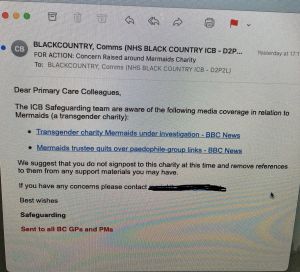One of our staff members is contributing considerably to a News Archiving service at Mu. Any well educated (Masters, PhD or above) users who wish to make comments on news sites, please contact Jim Burton directly rather than using this list, and we can work on maximising view count.
Safeguarding

Safeguarding is the practice by authorities and communities of "protecting the interests" of children and others who they judge to be "vulnerable". It can therefore be seen as an ongoing "protective" influence on behalf of children, without their input or consent.
The term has become particularly common in the UK, where it is used by local authorities to legitimize a range of protective measures, a number of which might come under increased scrutiny if assessed on their individual merits. Safeguarding is part of an array of obfuscatory terms used by governments to legitimize powers they have over the running of everyday life.
Linkage with conservative feminism, abuse for political ends
More recently, the term has been explicitly adopted by radical (conservative) feminists, much like grooming. One prime example is the British Safe Schools Alliance, a front-group that adopts the optics of a charity to push a radical anti-trans agenda.[1] Examples of this abuse for political ends can be seen throughout social media, whenever neopuritan, education-adjacent British feminists are mobilized by controversies centering on the normalization of attraction to minors, such as in the case of Jacob Breslow.
Linkage with racism
It has been suggested, particularly by left-wing writers, that the idea of "safeguarding or rescuing children" both perpetuates and institutionalizes a racist belief system, allowing legacy racism to persist in the age of "equality and diversity". Africans and non-white people outside the western world are painted as passive victims in need of saving by western NGOs, but as culpable, predatory youth "delinquents" within said democracies. This is said to be achieved by way of selective application, whereby the racist nature of child safeguarding and childhood innocence discourse, works as a "double-edged sword" against non-white youth around the world.
The creation of the innocent girl-child persona can be traced back to concerns about "white slavery" in the mid-late 1800s. In the 1970s, this language was even redeployed in order to frame black adult males as the captors and exploiters of America's girls.[2] Thus, the social/psychological target we are protecting, is seen as a vulnerable but treasured institution of female purity that invokes the nation and race, excusing sometimes violent, criminal and unconstitutional actions by governments.
Conservative rebuttals and counter-rebuttals
Serious conservative scholars who have studied this topic tend not to contest the idea that racism is emergent in particular parts of the child safeguarding response, but may dispute the extent to which safeguarding and innocence discourse serves the ends of a racist corporate-state zeitgeist:
- The public perception that there is "no such thing as a black/non-white pedophile" is cited as one such counter-example. Leftist/progressive critics would respond that this is because pedophilia is seen as a socially unshackled "animal impulse" inherent to all non-white men, and therefore not a defining feature. Thus the idea that white men who engage in "sex crimes" such as child pornography are "transgressors" is in itself implicitly racist. Grooming-gang scandals, such as in the UK, are pointed to as other examples of xenophobic safeguarding concerns, particularly with reference to the ease with which the term "rape" is used to describe voluntary prostitution by white working-class girls with Pakistani men in Northern English racial-ghetto street-scenes.
- Another counter-example is the sympathetic response of child trafficking charities towards (often African) migrant children who claim to have been abused, sometimes sexually, after trafficking into western democracies. Such charities and child protective services are often sympathetic to stories that law-enforcement agencies refuse to believe, as documented in our article on CSEC. Leftist proponents of the racialized theory of child safeguarding would then point out that this is simply evidence of how the system as a whole, first disempowers non-white youth and then paints them as a "problem in any event". Said "problem" immigrant youth must therefore be seen either as a culpable immigration offender, complicit in the falsification of documents for example, or as a "coerced/trafficked abductee", with no middle ground existing.